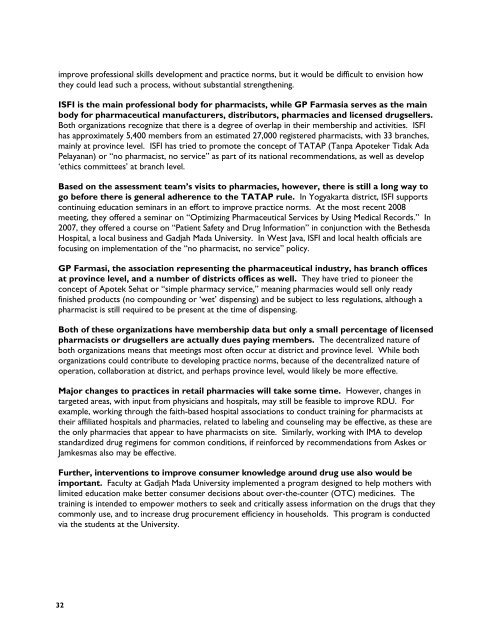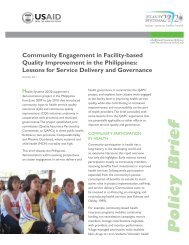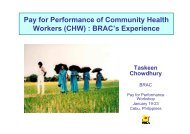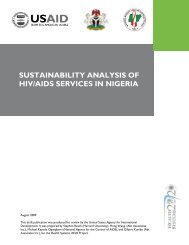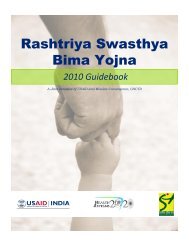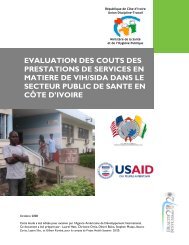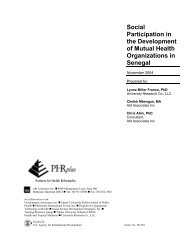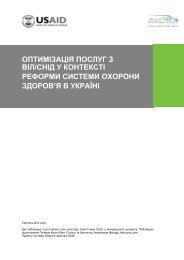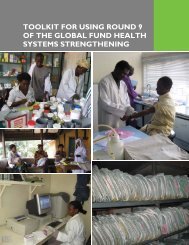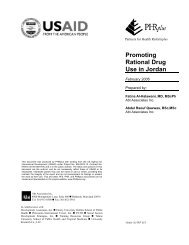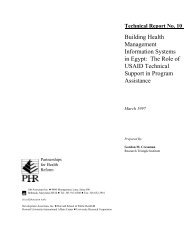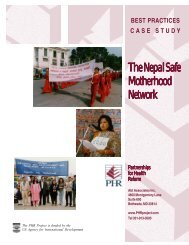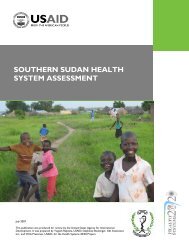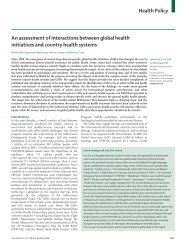PRIVATE SECTOR HEALTH CARE IN INDONESIA - Health Systems ...
PRIVATE SECTOR HEALTH CARE IN INDONESIA - Health Systems ...
PRIVATE SECTOR HEALTH CARE IN INDONESIA - Health Systems ...
- No tags were found...
You also want an ePaper? Increase the reach of your titles
YUMPU automatically turns print PDFs into web optimized ePapers that Google loves.
improve professional skills development and practice norms, but it would be difficult to envision howthey could lead such a process, without substantial strengthening.ISFI is the main professional body for pharmacists, while GP Farmasia serves as the mainbody for pharmaceutical manufacturers, distributors, pharmacies and licensed drugsellers.Both organizations recognize that there is a degree of overlap in their membership and activities. ISFIhas approximately 5,400 members from an estimated 27,000 registered pharmacists, with 33 branches,mainly at province level. ISFI has tried to promote the concept of TATAP (Tanpa Apoteker Tidak AdaPelayanan) or “no pharmacist, no service” as part of its national recommendations, as well as develop‘ethics committees’ at branch level.Based on the assessment team’s visits to pharmacies, however, there is still a long way togo before there is general adherence to the TATAP rule. In Yogyakarta district, ISFI supportscontinuing education seminars in an effort to improve practice norms. At the most recent 2008meeting, they offered a seminar on “Optimizing Pharmaceutical Services by Using Medical Records.” In2007, they offered a course on “Patient Safety and Drug Information” in conjunction with the BethesdaHospital, a local business and Gadjah Mada University. In West Java, ISFI and local health officials arefocusing on implementation of the “no pharmacist, no service” policy.GP Farmasi, the association representing the pharmaceutical industry, has branch officesat province level, and a number of districts offices as well. They have tried to pioneer theconcept of Apotek Sehat or “simple pharmacy service,” meaning pharmacies would sell only readyfinished products (no compounding or ‘wet’ dispensing) and be subject to less regulations, although apharmacist is still required to be present at the time of dispensing.Both of these organizations have membership data but only a small percentage of licensedpharmacists or drugsellers are actually dues paying members. The decentralized nature ofboth organizations means that meetings most often occur at district and province level. While bothorganizations could contribute to developing practice norms, because of the decentralized nature ofoperation, collaboration at district, and perhaps province level, would likely be more effective.Major changes to practices in retail pharmacies will take some time. However, changes intargeted areas, with input from physicians and hospitals, may still be feasible to improve RDU. Forexample, working through the faith-based hospital associations to conduct training for pharmacists attheir affiliated hospitals and pharmacies, related to labeling and counseling may be effective, as these arethe only pharmacies that appear to have pharmacists on site. Similarly, working with IMA to developstandardized drug regimens for common conditions, if reinforced by recommendations from Askes orJamkesmas also may be effective.Further, interventions to improve consumer knowledge around drug use also would beimportant. Faculty at Gadjah Mada University implemented a program designed to help mothers withlimited education make better consumer decisions about over-the-counter (OTC) medicines. Thetraining is intended to empower mothers to seek and critically assess information on the drugs that theycommonly use, and to increase drug procurement efficiency in households. This program is conductedvia the students at the University.32


